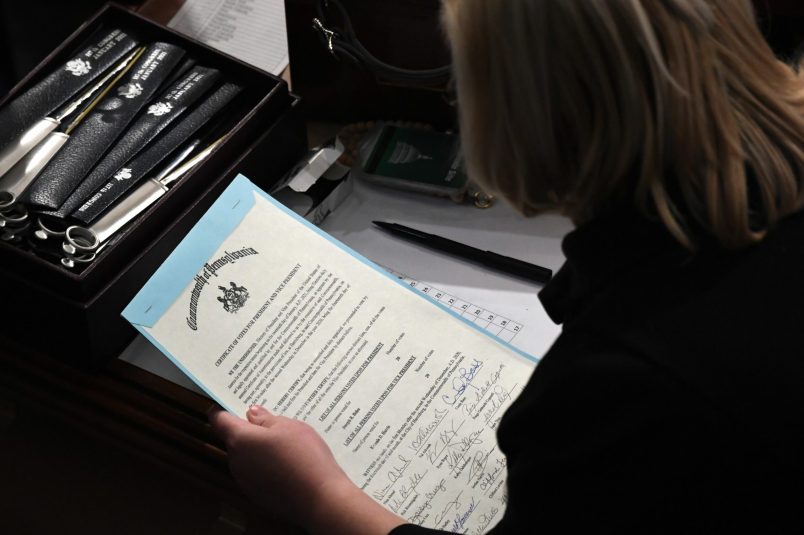The New York Times on Wednesday published two memos from the 2020 Trump campaign legal team showing their early planning for using alternate electors and the Jan. 6 Electoral College certification date to overturn Joe Biden’s victory.
First in November and then in December, Trump campaign attorney Kenneth Chesebro wrote memos to Trump’s campaign recount team in Wisconsin stressing that Jan. 6 — not earlier dates when Electoral College votes are actually assigned and cast — was the key date for the Trump campaign’s focus.
“It may seem odd that the electors pledged to Trump and Pence might meet and cast their votes on December 14 even if, at that juncture, the Trump-Pence ticket is behind in the vote count, and no certificate of election has been issued in favor of Trump and Pence,” Chesebro wrote in the first of the two published memos, dated Nov. 18, two weeks after Election Day. The memo’s first section was titled, “The January 6 Hard Deadline.”
“However, a fair reading of the federal statutes suggests that this is a reasonable course of action.”
The November memo concludes by saying the purported deadline for “resolving post-election challenges” could prove “critical” for the Trump campaign. It compared the situation to the 2000 Gore-Bush campaign, in which “the failure of the Gore team in 2000 to focus on the real deadline early enough was a clear mistake.”
In early December, the Times noted, the memos’ recipient, James R. Troupis, had filed a lawsuit on behalf of the Trump campaign in Wisconsin seeking to invalidate the votes of absentee voters in Milwaukee and Dane counties.
On Dec. 9, another memo from Chesebro to Troupis outlined the strategy in several key swing states, laying out across multiple pages the legal details of how the campaign might submit an alternate slate of electors in several states.
“It appears that even though none of the Trump-Pence electors are currently certified as having been elected by the voters of their States, most of the electors (with the possible exception of the Nevada electors) will be able to take the essential steps needed to validly cast and transmit their votes, so that the votes might be eligible to be counted if later recognized (by a court, the state legislature, or Congress) as the valid ones that actually count in the presidential election,” the memo read.
It concluded with a run down of how “problematic” each state might be.
“In conclusion, it appears that voting by an alternative slate of electors is unproblematic in Arizona and Wisconsin; slightly problematic in Michigan (requiring access to the senate chamber); somewhat dicey in Georgia and Pennsylvania in the event that one or more electors don’t attend (require gubernatorial ratification of alternates); and very problematic in Nevada (given the role accorded to the Secretary of State).”
Of course, electors associated with the Trump campaign ultimately gathered and signed fake, alternate elector forms — a fact now under investigation by both the Jan. 6 Select Committee and the Department of Justice.







Pretty soon, there will be a full complement of smoking guns—all pointing directly at Donald Trump.
The live hearings in Spring are going to be lit.
Fair to a despotic megalomaniac tyrant, perhaps…
and yet Rep. Nicole Malliotakis (R-NY) has the nerve to state “We know one thing from the Democrats this year: It is that if they can’t win by the rules, they’ll change the rules.”
smh
That’s really a mind boggler of a statement. A fair reading of our election laws says that we can ignore them and all the votes.
With today’s GQP, every accusation is a confession.